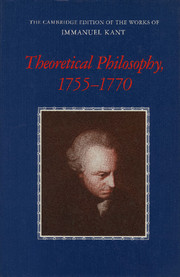Book contents
- Frontmatter
- Contents
- General editors' preface
- Preface
- Guide to abbreviations
- General introduction
- Introductions to the translations
- Résumés of the works
- A NEW ELUCIDATION OF THE FIRST PRINCIPLES OF METAPHYSICAL COGNITION (1755)
- THE EMPLOYMENT IN NATURAL PHILOSOPHY OF METAPHYSICS COMBINED WITH GEOMETRY, OF WHICH SAMPLE I CONTAINS THE PHYSICAL MONADOLOGY (1756)
- AN ATTEMPT AT SOME REFLECTIONS ON OPTIMISM (1759)
- THE FALSE SUBTLETY OF THE FOUR SYLLOGISTIC FIGURES (1762)
- THE ONLY POSSIBLE ARGUMENT IN SUPPORT OF A DEMONSTRATION OF THE EXISTENCE OF GOD (1763)
- ATTEMPT TO INTRODUCE THE CONCEPT OF NEGATIVE MAGNITUDES INTO PHILOSOPHY (1763)
- INQUIRY CONCERNING THE DISTINCTNESS OF THE PRINCIPLES OF NATURAL THEOLOGY AND MORALITY (1764)
- M. IMMANUEL KANT'S ANNOUNCEMENT OF THE PROGRAMME OF HIS LECTURES FOR THE WINTER SEMESTER 1765 — 1766 (1765)
- DREAMS OF A SPIRIT-SEER ELUCIDATED BY DREAMS OF METAPHYSICS (1766)
- CONCERNING THE ULTIMATE GROUND OF THE DIFFERENTIATION OF DIRECTIONS IN SPACE (1768)
- ON THE FORM AND PRINCIPLES OF THE SENSIBLE AND THE INTELLIGIBLE WORLD [INAUGURAL DISSERTATION] (1770)
- Section 1 On the concept of a world in general
- Section 2 On the distinction between sensible things and intelligible things in general
- Section 3 On the principles of the form of the sensible world
- Section 4 On the principle of the form of the intelligible world
- Section 5 On method in metaphysics concerning what is sensitive and what belongs to the understanding
- Factual notes
- Bibliographies of editions and translations
- Glossary
- Biographical-bibliographical sketches of persons mentioned by Kant
- Index
Section 1 - On the concept of a world in general
Published online by Cambridge University Press: 18 December 2014
- Frontmatter
- Contents
- General editors' preface
- Preface
- Guide to abbreviations
- General introduction
- Introductions to the translations
- Résumés of the works
- A NEW ELUCIDATION OF THE FIRST PRINCIPLES OF METAPHYSICAL COGNITION (1755)
- THE EMPLOYMENT IN NATURAL PHILOSOPHY OF METAPHYSICS COMBINED WITH GEOMETRY, OF WHICH SAMPLE I CONTAINS THE PHYSICAL MONADOLOGY (1756)
- AN ATTEMPT AT SOME REFLECTIONS ON OPTIMISM (1759)
- THE FALSE SUBTLETY OF THE FOUR SYLLOGISTIC FIGURES (1762)
- THE ONLY POSSIBLE ARGUMENT IN SUPPORT OF A DEMONSTRATION OF THE EXISTENCE OF GOD (1763)
- ATTEMPT TO INTRODUCE THE CONCEPT OF NEGATIVE MAGNITUDES INTO PHILOSOPHY (1763)
- INQUIRY CONCERNING THE DISTINCTNESS OF THE PRINCIPLES OF NATURAL THEOLOGY AND MORALITY (1764)
- M. IMMANUEL KANT'S ANNOUNCEMENT OF THE PROGRAMME OF HIS LECTURES FOR THE WINTER SEMESTER 1765 — 1766 (1765)
- DREAMS OF A SPIRIT-SEER ELUCIDATED BY DREAMS OF METAPHYSICS (1766)
- CONCERNING THE ULTIMATE GROUND OF THE DIFFERENTIATION OF DIRECTIONS IN SPACE (1768)
- ON THE FORM AND PRINCIPLES OF THE SENSIBLE AND THE INTELLIGIBLE WORLD [INAUGURAL DISSERTATION] (1770)
- Section 1 On the concept of a world in general
- Section 2 On the distinction between sensible things and intelligible things in general
- Section 3 On the principles of the form of the sensible world
- Section 4 On the principle of the form of the intelligible world
- Section 5 On method in metaphysics concerning what is sensitive and what belongs to the understanding
- Factual notes
- Bibliographies of editions and translations
- Glossary
- Biographical-bibliographical sketches of persons mentioned by Kant
- Index
Summary
§1
In the case of a substantial compound, just as analysis does not come to an end until a part is reached which is not a whole, that is to say a SIMPLE, SO likewise synthesis does not come to an end until we reach a whole which is not a part, that is to say a WORLD.
In this exposition of the underlying concept, I have, in addition to the characteristic marks which belong to the distinct cognition of an object, also paid some little attention to the two-fold genesis of the concept out of the nature of the mind. For since this genesis, by serving as an example, can help us to secure a deeper insight into the method of metaphysics, it seems to me mat it should not be underestimated. Thus, it is one thing, given the parts, to conceive for oneself the composition of the whole, using an abstract concept of the understanding, and it is another thing to follow up this general concept, as one might do with some problem of reason, by the sensitive faculty of cognition, that is to say, to represent the same concept to oneself in the concrete by a distinct intuition. The former is done by means of the concept of composition in general, in so far as a number of things are contained under it (in reciprocal relations to each other), and thus by means of ideas of the understanding which are universal. The latter case rests upon the conditions of time, in so far as it is possible, by the successive addition of part to part, to arrive genetically, that is to say, by SYNTHESIS, at the concept of a compound; this case falls under the laws of intuition. In a similar way, when a substantial compound has been given, we arrive without difficulty at the idea of things which are simple by taking away generally the concept of composition, which derives from the understanding. For the things which remain when every element of conjunction has been removed are simple things.
- Type
- Chapter
- Information
- Theoretical Philosophy, 1755–1770 , pp. 377 - 383Publisher: Cambridge University PressPrint publication year: 1992
- 1
- Cited by

